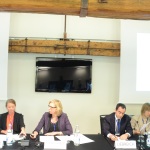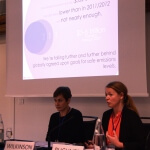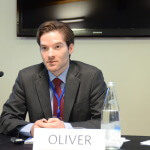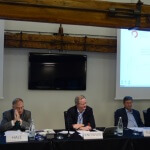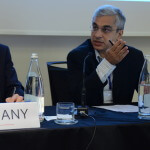Organized by Climate Policy Initiative (CPI) in collaboration with the World Bank Group, China Light Power (CLP) and the Organisation for Economic Co-operation and Development (OECD), the Fourth Annual Meeting of the San Giorgio Group was held over one and a half days on the Island of San Giorgio Maggiore in Venice.
The San Giorgio Group assembles key financial intermediaries and institutions actively engaged in green, low-emissions finance.
For further information on the San Giorgio Group, please contact: admin@cpivenice.org.
Thomas Heller, Executive Director, Climate Policy Initiative The introductory session focused on the global state of climate-related financing activities of both the public and private sectors. It introduced the meeting’s central areas of interest and overarching questions for the subsequent sessions. Developments, achievements and challenges that have affected information about global climate financing over the past year were considered. A possible outlook of climate financing in light of the upcoming international negotiations to agree a new climate treaty, and identify areas where political and technical discussions could benefit from better information about the actors, policies, and instruments, that sit behind the climate finance landscape were also presented. Panelists provided insights how we can scale up public and private financing of green, low-emission projects and explore how these flows compare to conventional investments into “brown assets”. Chair: Jane Wilkinson, Director, Climate Policy Initiative Panelists: This session focused on the roles of the public and private sector in geothermal energy. Developing geothermal energy projects can require high risks and longer lead-in times than other kinds of renewables projects. Tailored technology-specific public finance support and tools are a prerequisite for success. Different countries have developed their geothermal resources in different ways with models ranging from total public-led development to private-led development, with different mixes in between. The session looked at how national policies, financing structures and industry capacities can deduce the best development model for that country. Chair: Kirsty Hamilton, Head of Policy, Low Carbon Finance Group Fellow, Chatham House Panelists: Meeting economic growth goals, environmental protection and climate resilience goals simultaneously, is a challenge for governments. Settings that promote economy-wide shifts to efficient land use and sustained growth in agriculture alongside the environmental protection are essential to deliver impact at scale, and to harness the experience, resources and reach of large agriculture businesses. Panelists discussed the challenges faced by governments, businesses and communities, in meeting increased global demand for food while addressing climate risk, and deliberated how partnerships between public and private actors can deliver integrated approaches and tools that deliver profit and growth, while guaranteeing the sustainability of supply and delivering benefits to communities. Chair: Vikram Widge, Head, Climate and Carbon Finance, International Finance Corporation (IFC), The World Bank Group Panelists: Closing remarks by Thomas C. Heller, Executive Director, Climate Policy Initiative Dinner remarks on The Global Innovation Lab for Climate Finance Friday, 17 October 2014 What does success look like in the green bonds market? This session focused on how we should view growth in the green bonds market and measure progress. Panelists considered whether the labelling of bonds in order to green fixed-income portfolios is an objective in and of itself, or whether labelling could also catalyze a measurable increase in climate finance flows. From the issuer’s perspective, the question discussed was whether demand for green bonds can alter behaviors or business models? From the investor’s perspective, whether green bonds can help manage climate/carbon risk? Does labelling result in having limited investment silos within portfolios or can it integrate across asset classes? And, finally, from the policy perspective, the question posed was what are the right tools to incentivize greater allocations to climate finance? Chair: Simon Upton, Director, Environment Directorate, OECD Panelists: Green investments in emerging markets are gaining steam – but remain far below levels needed to achieve a low-emission transition in these countries that is in line with national targets and global temperature goals. Policies and supporting mechanisms are at different stages of development across emerging markets and lessons are now being learned. Among these, it is apparent that in emerging economies, a particular set of risks, both real and perceived, impedes investments and presents a major hurdle for scaling up green investment flows. This session discussed how to address obstacles and identify strategies to channel additional private investments into green projects in emerging markets. Panelists drew on their expertise in Brazil, India, Indonesia and Africa and shared what has worked on the ground and what has not, considering the role and interplay of the right policies, Development Finance Institutions and private investors to unlock green investments in emerging markets. Chair: Nikolaus Schultze, Assistant Director-General, Public-Private Cooperation Division, Global Green Growth Institute Panelists: Global climate finance flows have plateaued and remain far below even the most conservative estimates of financing needs for a pathway to a low-emission transition. Additionally, climate finance exhibits a significant “home bias”, with three quarters of flows remaining in the country of origin. This session focused on innovative instruments that will foster cross-border climate investments. What elements do new instruments need to incorporate to ensure that they are actionable and replicable at scale? Panelists highlighted how different financial instruments can target institutional investors’ and private capital to support foreign investments. The session concluded in providing an outlook on necessary next steps to increase innovative finance and contribute to bridging the financing gap. Chair: Thomas C. Heller, Executive Director, Climate Policy Initiative Panelists: Closing of the meeting by Thomas Heller, Executive Director, Climate Policy Initiative. 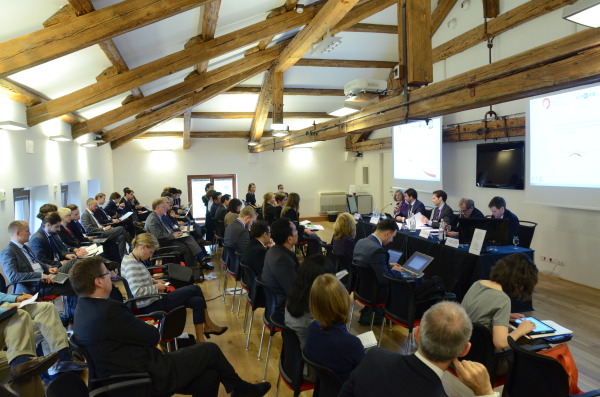
Thursday, 16 October 2014
Welcome
Introductory Panel: Global States of Play
Presentation: OECD – Update on Tracking Climate Finance
Presentation: Climate Tracking: The Joint MDB Approach
Presentation: Low Carbon Investment Registry
Panel: Financing High-Cost/Advanced Renewable Energy – The Case of Geothermal Energy
Presentation: Gumuskoy Geothermal PP, Turkey
Presentation: Financial Instruments to Scale up Investment in Geothermal Power. A Mexican Approach
Panel: Financing Efficient and Resilient Land Use
Presentation: Financing Efficient and Resilient Land Use
Presentation: Allianz Climate Solutions
Presentation: Science-based Sequestration Commitments and Reporting by Financial Indices and Corporations
Presentation: Land Use in BrazilSocial Dinner
Panel: Green Bonds – Solution or Labelling?
Presentation: The Flows of Climate Finance 2014
Presentation: Green Bond Update
Presentation: Mapping Channels to Mobilise Institutional Investment in Sustainable Energy
Presentation: Green Bonds – Solution or Labelling?
Panel: How to Scale up Green Investments in Emerging Markets?
Presentation: Promoting Green Investment in Indonesia
Presentation: Renewable Energy Financing in India: Policy Recommendations. CPI-ISB Energy and Environment Program
Concluding Panel: Innovative Finance and Cross-Border Flows – Key in Scaling Up?
Presentation: PensionDanmark’s Investment Criteria
Vikram Widge, Head, Climate and Carbon Finance, International Finance Corporation (IFC), The World Bank Group

